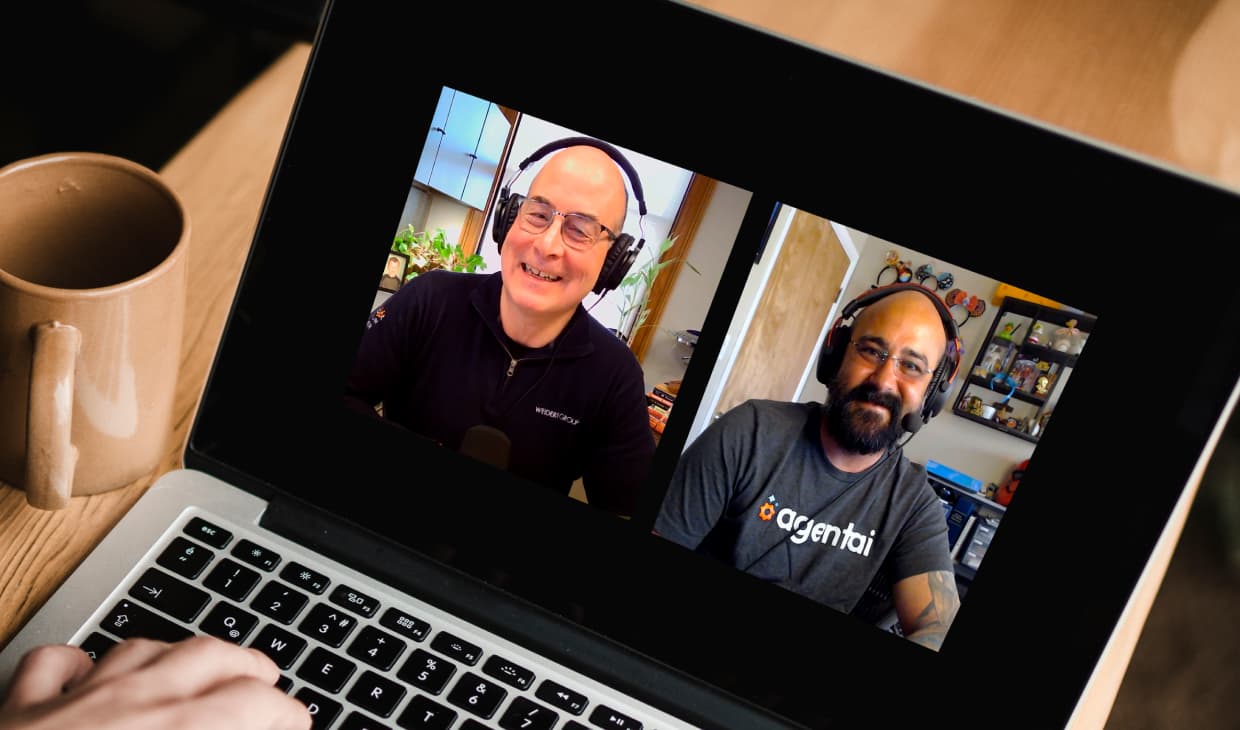Beyond Generative AI: How AI Maximizes Manufacturing Operations
Written by
We talk a lot about leveraging AI in B2B marketing, especially for the industrial sector. We even talk about how to AI-proof your content strategy. But AI impacts more than marketing; it’s also transforming operations on the manufacturing floor.
In the latest episode of The Changeover Podcast, I sat down with Caleb Waack, Chief Technology Officer at NEXT, a company that specializes in building AI-powered decision engines that transform manufacturing data into real-time, actionable insights.
The bottom line: AI can empower workers in new ways, enhancing productivity, operational efficiency, and employee satisfaction.
In this 20-minute podcast episode, Caleb and I explore how AI is stepping in as a powerful solution to the most pressing challenges facing manufacturers today. Here’s a synopsis of our conversation, along with the full episode to learn more.
Check out episode 12 of The ChangeOver now, then subscribe on Apple, YouTube, Spotify, Weidert.com, or your favorite podcast app.
The Role of AI: Addressing Manufacturing Challenges
From workforce shortages to managing complex systems overflowing with data, manufacturers today are navigating a landscape filled with significant challenges that impact their ability to remain competitive and efficient. Just some of the challenges include:
- Labor shortages that aren’t letting up; projected recently by the Wall Street Journal to be 50% unfilled (1.9 million jobs) by 2033
- Knowledge loss: experienced employees are poised to take decades of expertise with them when they retire
- Unactionable data: IoT sensors and machine learning tools have allowed manufacturers to collect vast amounts of data but they often lack the ability (or time) to turn it into actionable insights
- Operational inefficiencies: Outdated systems and processes can lead to increased waste, downtime, and reduced profitability
How AI Impacts the Factory Floor
Addressing these challenges requires a blend of advanced technologies like AI combined with strategic approaches that empower teams and optimize operations for sustained growth. In our conversation, Caleb highlighted how AI is making a difference.
Easing Labor Shortages, Empowering Workers
One of the reasons manufacturers are seeing significant labor shortages is because so many skilled workers are retiring and fewer are entering the field to replace them. This gap is leading to productivity strains and knowledge loss from one generation to the next.
- AI tools fill productivity gaps by enabling fewer workers to manage more equipment efficiently
- AI helps capture and transfer knowledge to new employees, ensuring consistency and continuity, and allowing them to mentor new hires effectively
"What if you could take your best employee and have them at every step of your operation, every single minute of the day? AI makes that possible." — Caleb Waack, NEXT
Caleb shared how AI empowers experienced operators to extend their expertise across multiple machines by providing real-time insights and recommendations. Instead of just one machine, operators could efficiently manage up to 12 machines without skipping a beat. How? AI technology automates routine monitoring and decision-making, freeing operators to focus on higher-level tasks and problem-solving.
Integrating with IoT to Add Value and Keep Humans in Control
While IoT has revolutionized manufacturing by enabling machines and systems to collect vast amounts of data, its capabilities often stop at data collection. IoT devices lack the intelligence to interpret all that data or suggest actionable steps. As Caleb put it, this leaves manufacturers in a “data-rich but insight-poor” scenario, where they can monitor performance but struggle to translate raw data into meaningful improvements.
"AI bridges the gap between being data-rich and insight-poor, empowering operators to make better decisions in real time." — Caleb Waack, NEXT
Without tools to analyze patterns or provide real-time recommendations, IoT alone falls short of driving the operational efficiency and productivity gains that manufacturers need. That’s where AI comes in.
- AI adds value by analyzing IoT data, identifying patterns, and offering actionable insights
- AI integrates seamlessly with existing systems (e.g., human-machine interfaces, sensors, robotics) without requiring major equipment upgrades
- Instead of replacing workers, AI empowers them to be more efficient, keeping them in control and helping them feel more fulfilled in their roles
Pinpointing Issues and Solving Problems in Real Time
AI enables manufacturers to identify and address issues earlier in the production process by analyzing data in real-time and detecting patterns that indicate potential problems. This proactive approach allows operators to:
- Make immediate adjustments
- Prevent defects or inefficiencies before they escalate
- Reduce waste and minimize downtime
- Lower costs and optimize resource utilization
Case Study: How AI Optimized Production & Profits
What might this look like in real life? Caleb shared about a coffee manufacturer that achieved remarkable results by implementing AI to enhance its operations.
With minimal training, operators used real-time insights provided by AI, resulting in:
- Workers making decisions 20% more accurately
- Significantly fewer defects and reduced waste
- A savings of over $250,000 in less than six months
AI is more than just a marketing and sales tool — it’s a way for manufacturers to empower workers, optimize operations, and drive measurable growth.
Gain more insights into the latest manufacturing and marketing trends and insights by catching all of the latest episodes of The Changeover Podcast. Subscribe today.
Subscribe To Our Blog
Information. Insights. Ideas. Get notified every time a new Weidert Group blog article is published – subscribe now!
You May Also Like...

Artificial Intelligence
Revenue-Driving B2B Content Marketing Strategy with Andy Crestodina

Artificial Intelligence
AI Agents Are Here—How Smart Businesses Are Using Them Now

Inbound Marketing
Podcasting Playbook: What We Learned After 100 Days of Running a B2B Podcast
Accelerate Your Growth with
Weidert Group
If you’re ready to explore a partnership, request a personalized consultation with our team.

